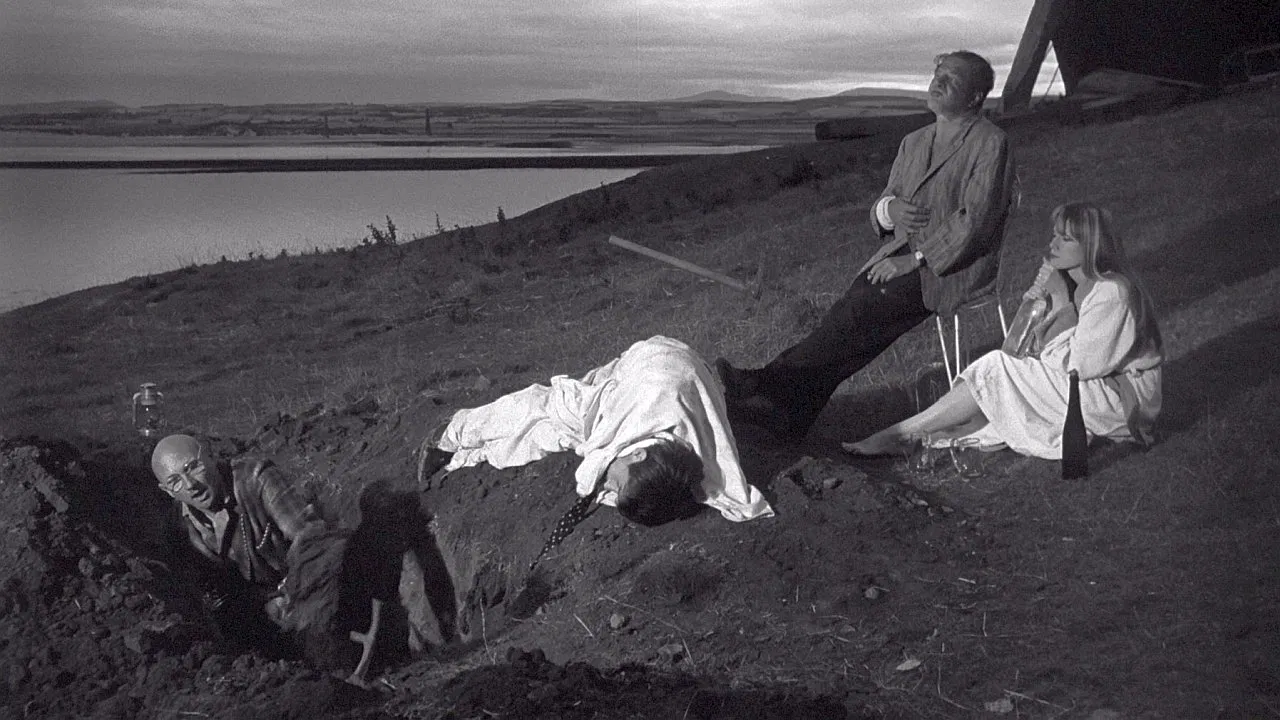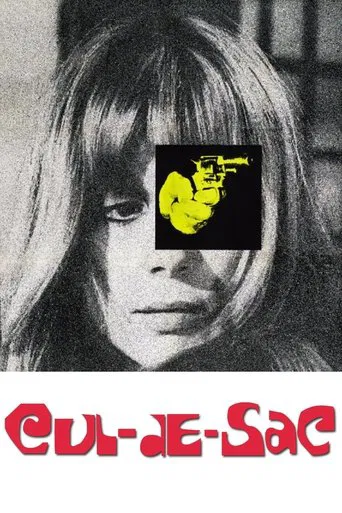

From my favorite movies..
... View MoreIn other words,this film is a surreal ride.
... View MoreWhile it doesn't offer any answers, it both thrills and makes you think.
... View MoreThe plot isn't so bad, but the pace of storytelling is too slow which makes people bored. Certain moments are so obvious and unnecessary for the main plot. I would've fast-forwarded those moments if it was an online streaming. The ending looks like implying a sequel, not sure if this movie will get one
... View MoreSamuel Beckett refused to give Polanski the rights to film Waiting for Godot and so the director created with Gerard Brach a script with strong echoes of the famous play (and some by Harold Pinter). A mixture of Gothic horror picture, black comedy, and classic gangsters American pictures, Cul-de-Sac is a parody of all these genres and also a tragedy. Hopelessness, humiliation, perversion - constant motifs of his films -, are presented here below a thick veil of grotesque. The arrival to the castle of a wounded gangster who tries to be rescued by his boss, and his immediate physical and mental domain of the hostages, untie openly the woman's despise of her husband, the cowardice and vulnerability of him and both dependence on the intruder. The couple breeds chicken and the chicken seem fulfill the function that had the chorus in the Greek tragedy, Polanski is mocking in this way the solemnity of the serious genre that notwithstanding has adopted. Like in others of his films, the director remits to scenes of his former works and make also homage to some admired creators - Hitchcock's The Birds, for instance (when some birds descend on the courtyard of the castle in the manner of the mentioned picture, but without the expected consequences (another game of Polanski). The Godot of this story, Katelbach, like that of Beckett, will never appear and, in this case, shall leave a message exempting himself of any responsibility. Nobody expected shall come to rescue, the woman will escape with a new lover, the gangster is murdered by the landlord and the landlord will lament, sitting on a rock in the sea, his infinite misery. Counting with a suggestive photography by Gil Taylor, who plays smartly with shadows and lights, Polanski likes to pursue the spectators with sudden movements of the camera that show the characters withdrawing from or running over the spectators, who sometimes serve as the supposed mirror where the fictional creatures are looking at themselves. The formal perfection of many scenes could not dissimulate some serious downfall of rhythm and excessive stereotype of characters and not few dialogs. The film is perhaps too much long and repetitive, but this apparent fault contributes to intensify the atmosphere of obsession and dismay, which are considered principal marks of the director's pessimist vision of world.
... View MoreWhat? Lionel Stander -- that caricature of a dumb mobster from the movies of the 30s and 40s -- a principal actor in an experimental and arty film by Roman Polanksi? He's older here and has the face of a beat-up pug who has turned to booze, but he has the same coffee-grinder voice and uses his mammoth presence to good advantage. He pokes indelicately through the drawers in the bedroom and comments, "Ahh, milady's fineries?" He's more funny than menacing.Briefly, he's a refugee from a hold up gone wrong. Stander and his friend, Jack MacGowran, who promptly dies of his wound, find themselves in this ramshackle imitation of Mont St. Michel, somewhere on the English coast. The owner is Donald Pleasance and his wife is Francoise Dorleac. The place is overrun with chickens. Stander makes himself at home. Everybody gets drunk and buries MacGowran in the back yard. They suffer a visit from some of Pleasance's friends, during which Stander poses as the butler. It ends with a lot of bullets being fired, and Pleasance sitting alone, cackling to himself, atop a rock in the shallows of the sea.The performances aren't bad, given what the actors had to work with. Pleasance, as bald as ever, is seen in shorts, gangly and awkward, his skinny limbs flapping about like a life-sized mannequin's. Dorleac, on the other hand, does not flap, neither does she gangle. She's exquisite, like her sister, Catherine Deneuve. (Alas, she died at an early age.) In some scenes she dashes around nude, which struck me as a nice artistic touch. Ewww. Polanski certainly had an eye for good-looking women. Jacqueline Bisset appears too, but only briefly, and she never removes her shades and has only three lines in the movie.The movie is well photographed in black and white but sluggish and a little dull. Polanski was the writer/director and it's as if he's still getting used to having a camera at his disposal, so busy with it that the story descends into the pointless. The best of his movies were superb but they always centered around a compelling plot in which recognizable characters are swept up. Not here. People seem to do things aimlessly. Five minutes is spent while Stander explores the kitchen and the chicken coop, sniffing eggs, peeking into the fridge. And nothing comes of it. Why is Dorleac so willful? What does she want from herself or anyone else? Why does Pleasance go mad at the end? There are some things man was never meant to know.Man, Polanski was to learn his trade well. Compare Stander's investigation of the kitchen or the bedroom with Jack Nicholson's exploration of Mulvahill's empty office in "Chinatown." Nicholson, too, opens drawers at random and flips through their contents -- but he's actually LOOKING for something and the shots are so precisely staged and timed that you can almost smell the shellac of the desk.Nope, this is a little boring, enlivened by a couple of scenes involving the naked Dorleac or some ferly confrontation. But Polanski was on the cusp of things much better.
... View MoreSomehow Roman Polanski's Cul-de-Sac (= French for 'dead end street') sticks to the mind.I suppose this is due to the unique & perfect mix of its devilish plot, its setting in a desolate seaside landscape, and the slight eccentricity of the castle's landlord.Add to it the great roles of the surviving gangster, and that of the landlord's young French wife -- a former prostitute.These three main characters connect convincingly with each other, all the way down to Cul-de-Sac's final credits. Which is quite impressive, given the enduring high-pressure tension in this film's bottom line.The black and white picturing seems to be OK, too. One feels that the use of color is needless here, and would only distract unnecessarily.About a year after its completion, Cul-de-Sac's devilish mood of impending doom was revived by the fate of female lead Francoise Dorleac. She died in a car accident.
... View MoreA wounded criminal, Dickie and his dying partner Albie find an old seaside castle.That castle is full of chickens and it is owned by the meek and a bit neurotic George and his sensual young wife Teresa.Now these two are the hostages of Dickie, who's waiting for his boss to come.Cul-de-sac (1966) was the second film of Roman Polanski in English.It's a fascinating movie, and a bit bizarre, perhaps.You have to like Donald Pleasence's work as George.His character is comical but also tragic, shy and sensitive, someone who's easy to be manipulated.The way George is ridiculed by his woman, who dresses him as a woman and puts on some make-up on him tells a lot about what kind of a man George is.Francoise Dorléac is perfect in the role of his Mrs.Lionel Stander is somewhat sympathetic as Dickie.Jack MacGowran, who's also remembered from Polanski's Dance of the Vampires from the next year, plays Albie brilliantly.Ian Quarrier plays Christopher.Jacqueline Bisset makes her second film appearance in a small role.This movie has a lot of memorable stuff.It's great to watch when they have unexpected guests of George's friends and Dickie has to portray a butler.Or the moments on the beach with Teresa swimming nude in the background.This movie has some comedy.It has some psychological thriller.It has some drama.It has everything to keep you captivated.
... View More